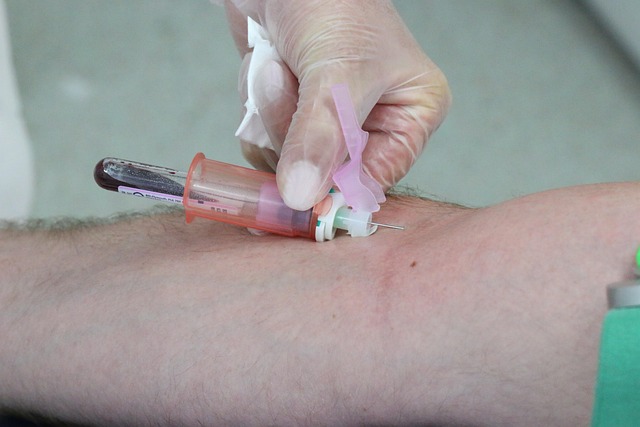In the UK, hormonal imbalances significantly impact reproductive health, with conditions like polycystic ovary syndrome (PCOS) and thyroid disorders affecting fertility. Key tools in diagnosing and treating these issues include blood tests, notably the UK Testosterone Blood Test, which measure testosterone levels to identify problems like hypogonadism or testicular trauma in men, and assess hormones like estrogen and progesterone for imbalances in women, guiding tailored treatments including hormone replacement therapy for improved fertility outcomes.
Hormone analysis plays a pivotal role in diagnosing and treating reproductive issues in both men and women. In the UK, understanding hormonal imbalances is crucial for maintaining reproductive health. This article delves into the significance of hormone analysis, focusing on key aspects like testosterone blood tests for male infertility and female fertility issues. By exploring these tests, we aim to empower individuals and healthcare professionals alike to navigate the complexities of reproductive health with enhanced knowledge and effective strategies. Specifically, we’ll be examining UK testosterone blood tests as a vital tool in diagnostic processes.
- Understanding Hormonal Imbalances and Reproductive Health in the UK
- The Role of Testosterone Blood Tests in Diagnosing Male Infertility
- Women's Hormone Analysis: Uncovering the Causes of Female Fertility Issues
Understanding Hormonal Imbalances and Reproductive Health in the UK
In the UK, understanding hormonal imbalances and their impact on reproductive health is crucial. Hormones play a vital role in regulating various bodily functions, including reproduction. When there’s an imbalance, it can lead to a range of issues for individuals seeking to conceive or maintain healthy reproductive systems. One common approach to assessing hormonal health is through blood tests, such as the UK Testosterone Blood Test, which helps identify imbalances in key hormones like testosterone.
These tests are essential tools for healthcare professionals to diagnose and treat conditions like polycystic ovary syndrome (PCOS), thyroid disorders, and other endocrine-related problems that can affect fertility. By understanding hormonal profiles, doctors can tailor treatments more effectively, ensuring optimal reproductive health outcomes for patients across the UK.
The Role of Testosterone Blood Tests in Diagnosing Male Infertility
In the UK, testosterone blood tests play a crucial role in diagnosing male infertility. These tests are essential tools for healthcare professionals to assess a man’s reproductive health as low testosterone levels can be indicative of various underlying issues that may impact fertility. By measuring the concentration of testosterone in the blood, doctors can identify if there is a deficiency or imbalance, which could be caused by conditions such as hypogonadism, testicular trauma, or certain medical treatments.
A UK Testosterone Blood Test is typically conducted early in the morning, as testosterone levels naturally fluctuate throughout the day. The results provide valuable insights into an individual’s hormonal health, enabling doctors to make informed decisions about subsequent treatment options. This may include recommendations for lifestyle changes, hormone replacement therapy, or other specialized interventions aimed at addressing the specific causes of low testosterone and improving fertility potential.
Women's Hormone Analysis: Uncovering the Causes of Female Fertility Issues
Women’s hormone analysis plays a pivotal role in uncovering the root causes of fertility issues, offering crucial insights for effective treatment and management. In the UK, advanced medical facilities now offer sophisticated testosterone blood tests as part of their diagnostic services. This test is instrumental in evaluating a woman’s hormonal balance, particularly focusing on key hormones such as estrogen and progesterone.
By analysing these hormone levels, healthcare professionals can identify imbalances that may impact fertility. For instance, low testosterone in women (a condition known as hypogonadism) can lead to reduced ovulation and irregular menstrual cycles, hindering conception. The UK testosterone blood test provides a non-invasive method to assess such hormonal discrepancies, enabling doctors to tailor treatment plans accordingly, whether through hormone replacement therapy or other medical interventions.
Hormone analysis plays a pivotal role in diagnosing and treating reproductive issues in both men and women across the UK. From understanding hormonal imbalances to specific tests like the UK testosterone blood test, medical professionals can uncover the root causes of infertility and related health problems. By utilizing advanced testing methods, such as analyzing women’s hormones, healthcare providers can offer tailored solutions, ultimately enhancing reproductive health outcomes.
